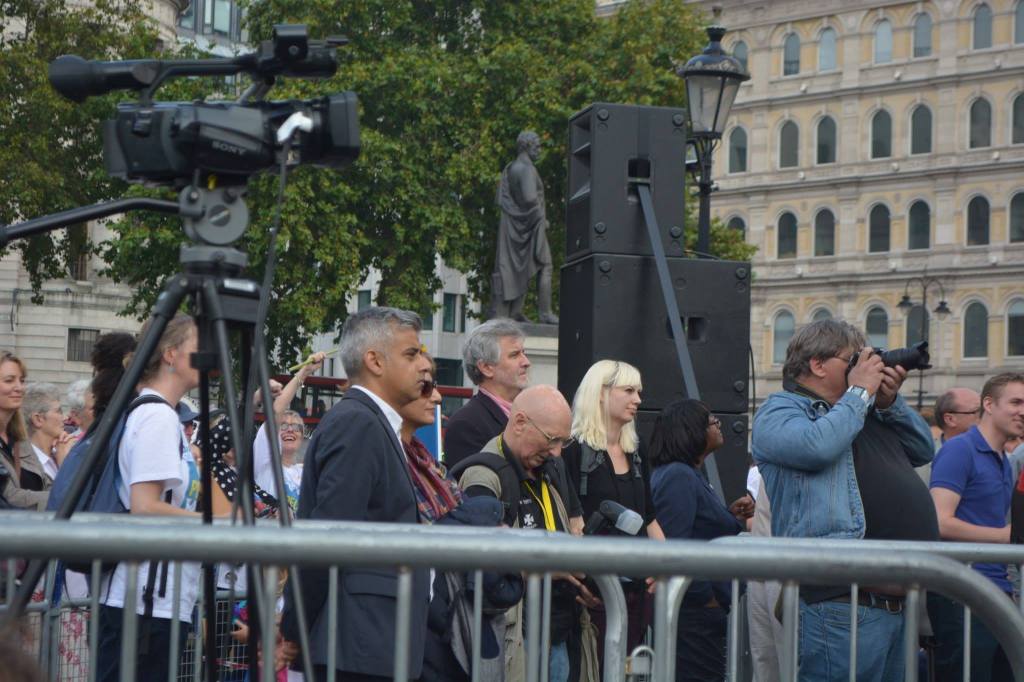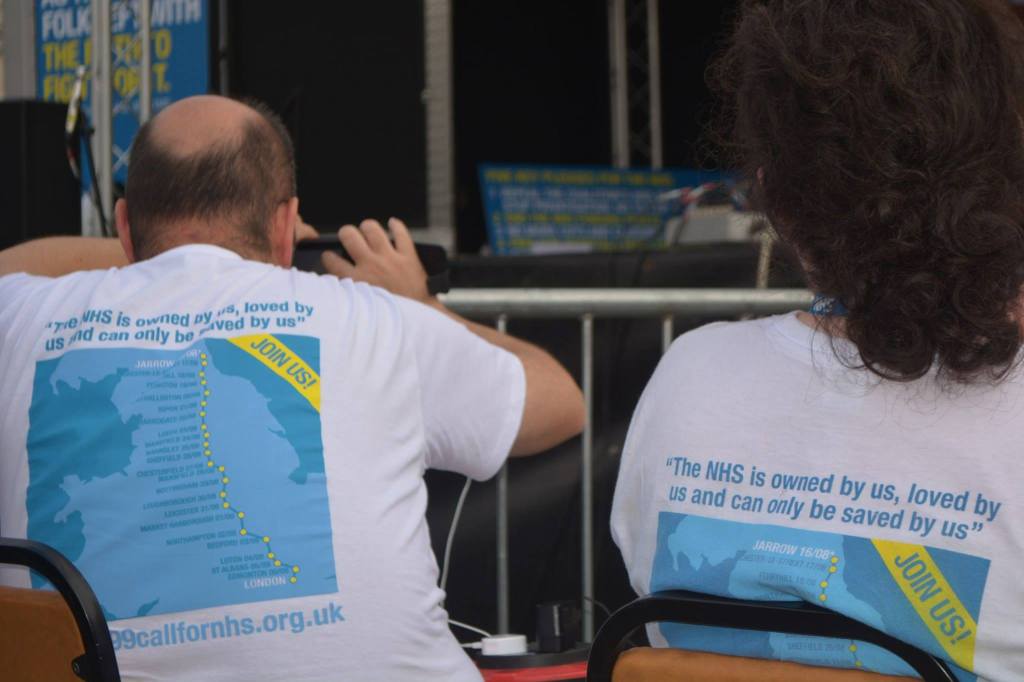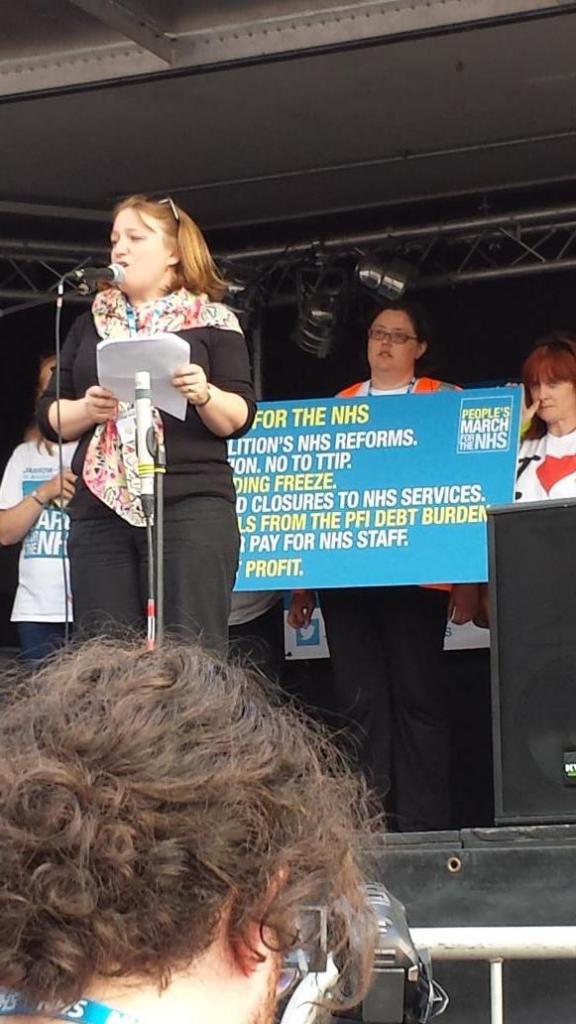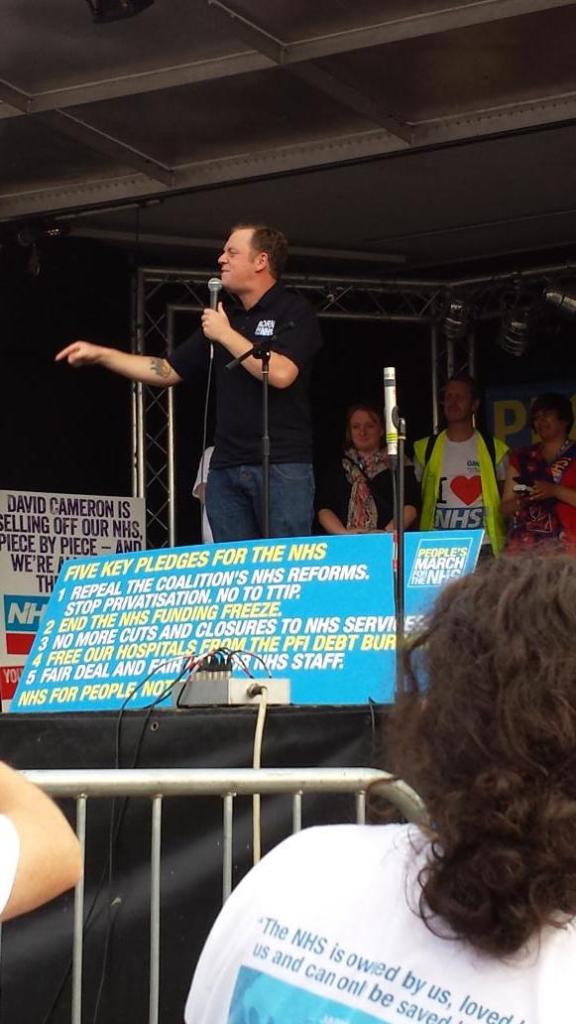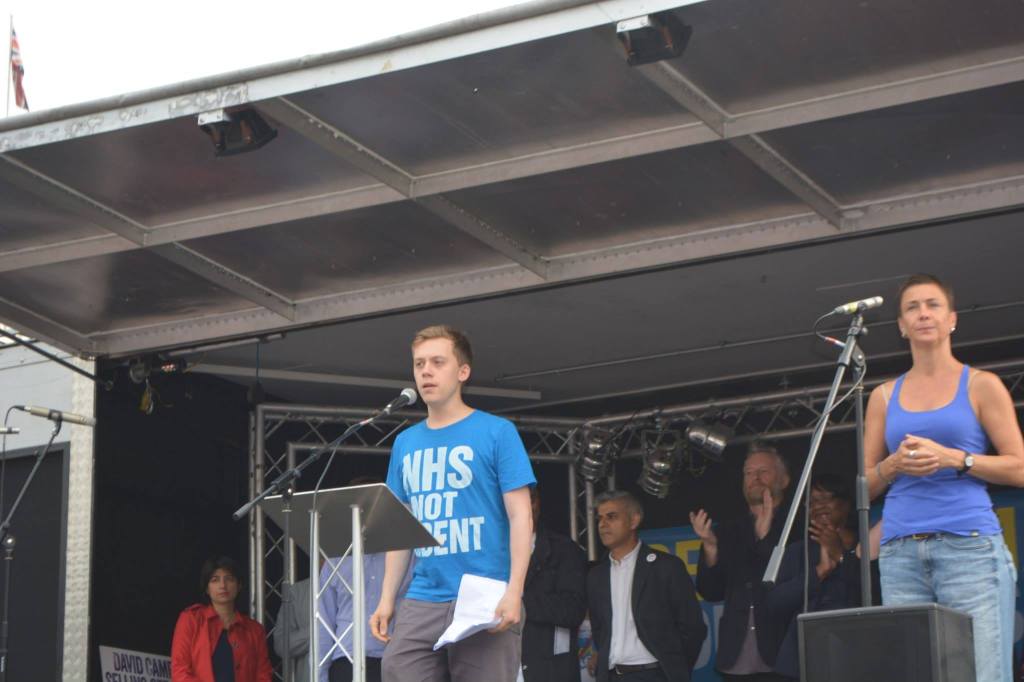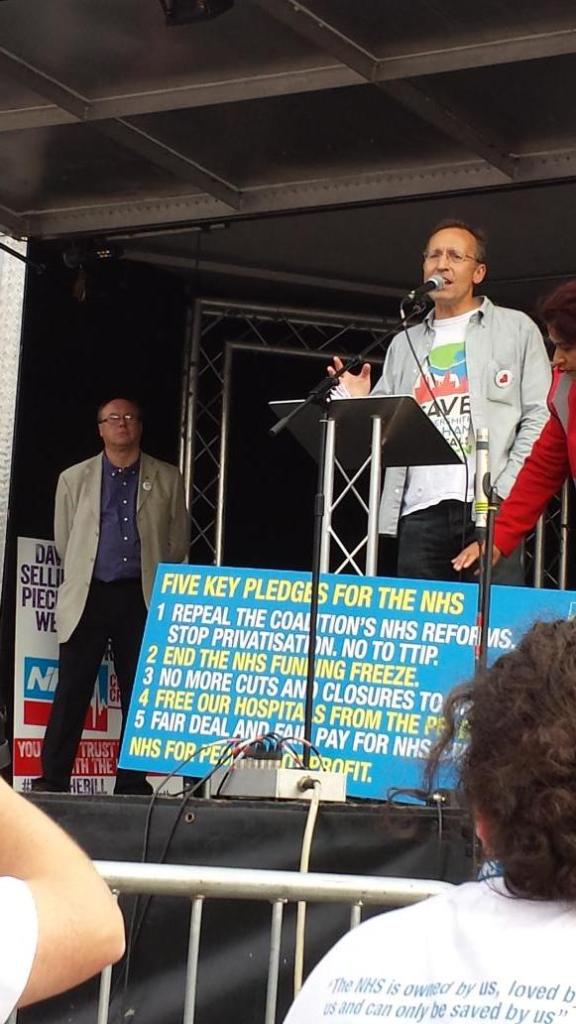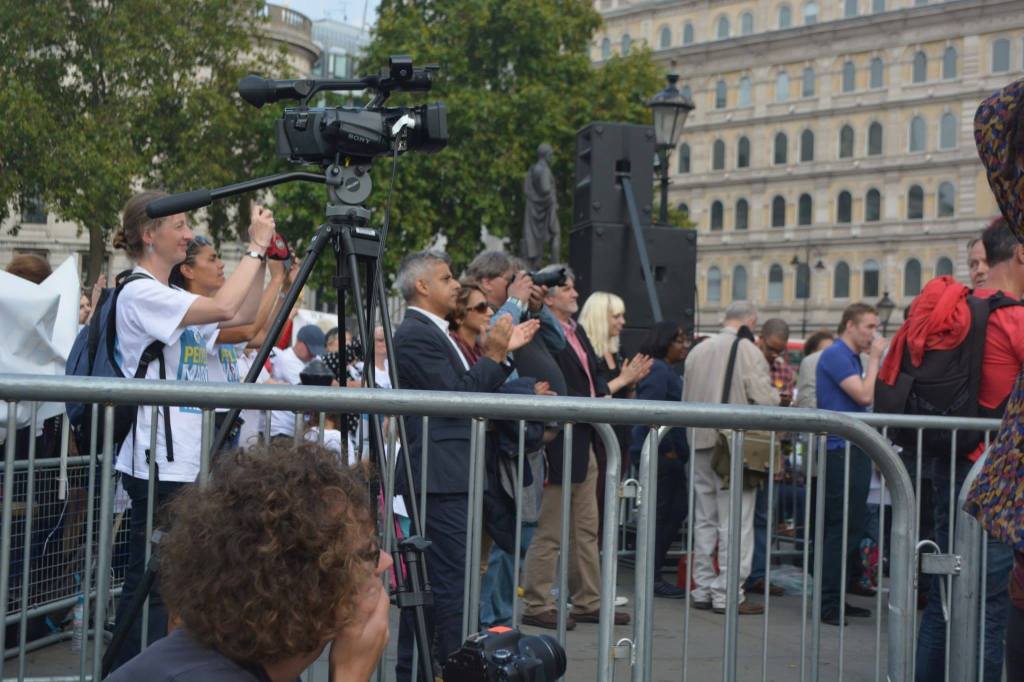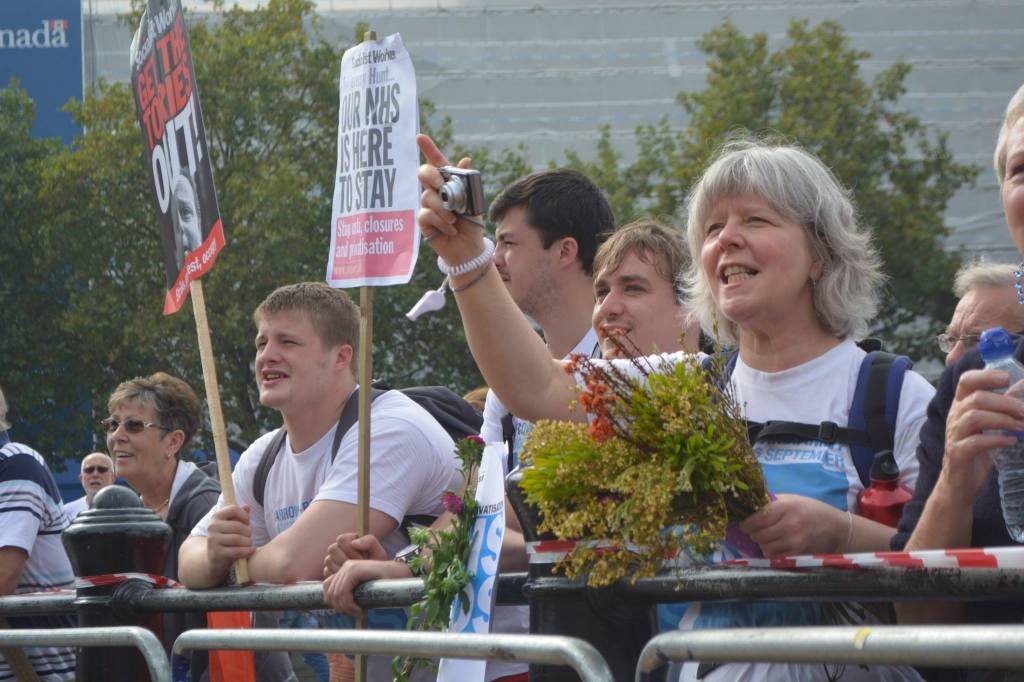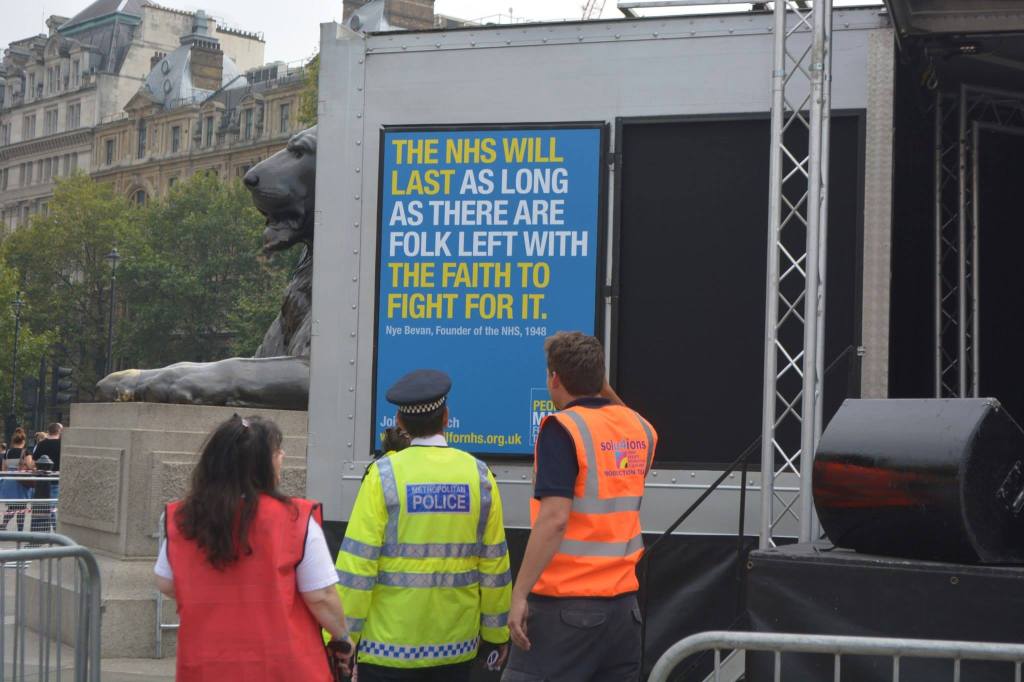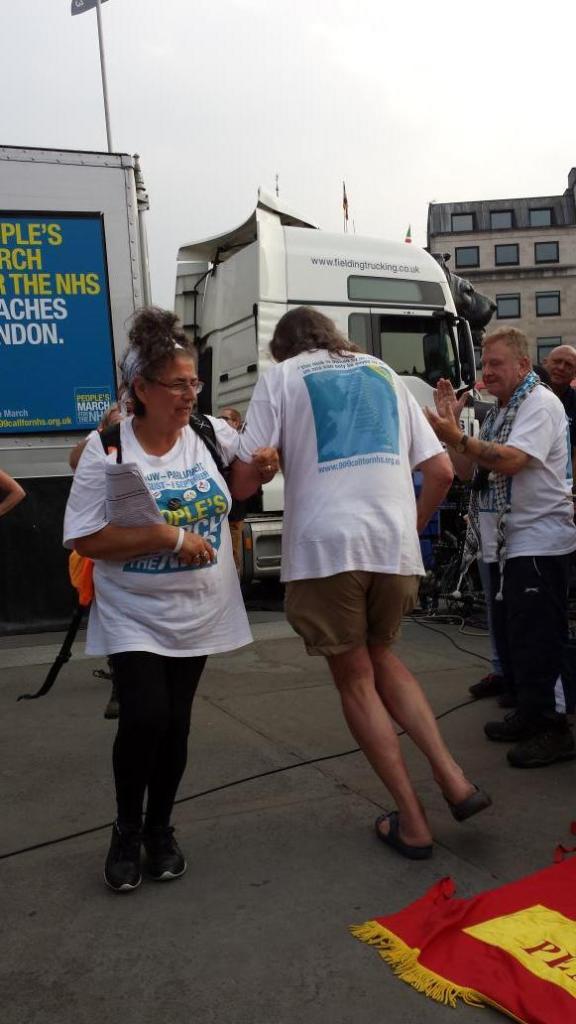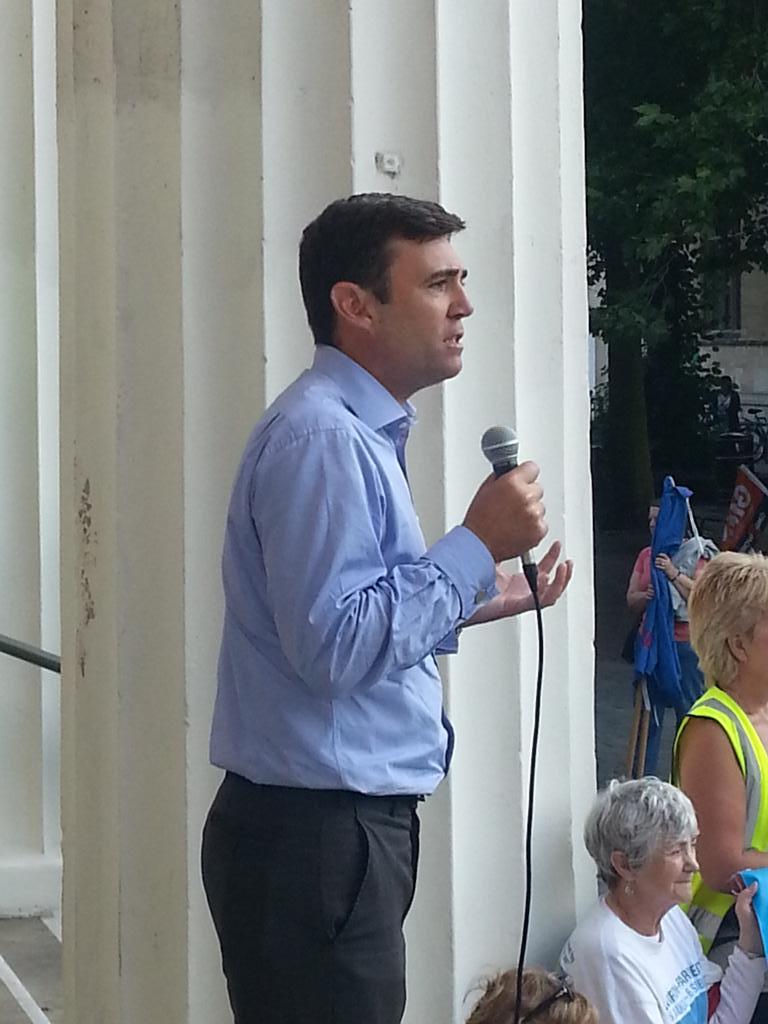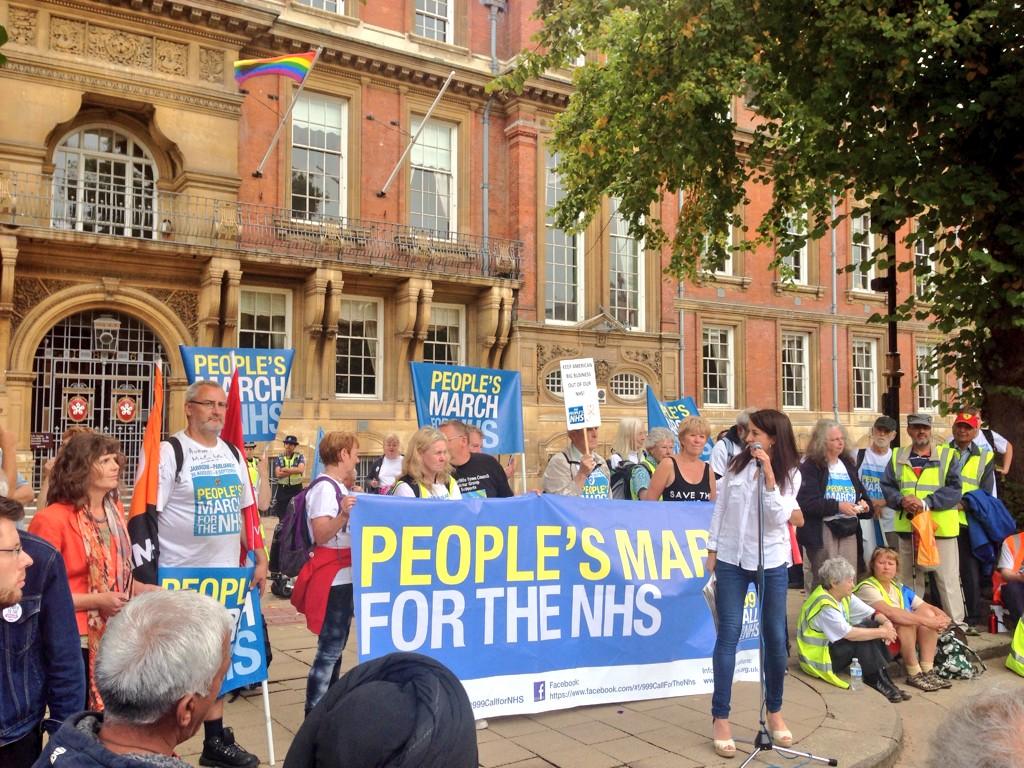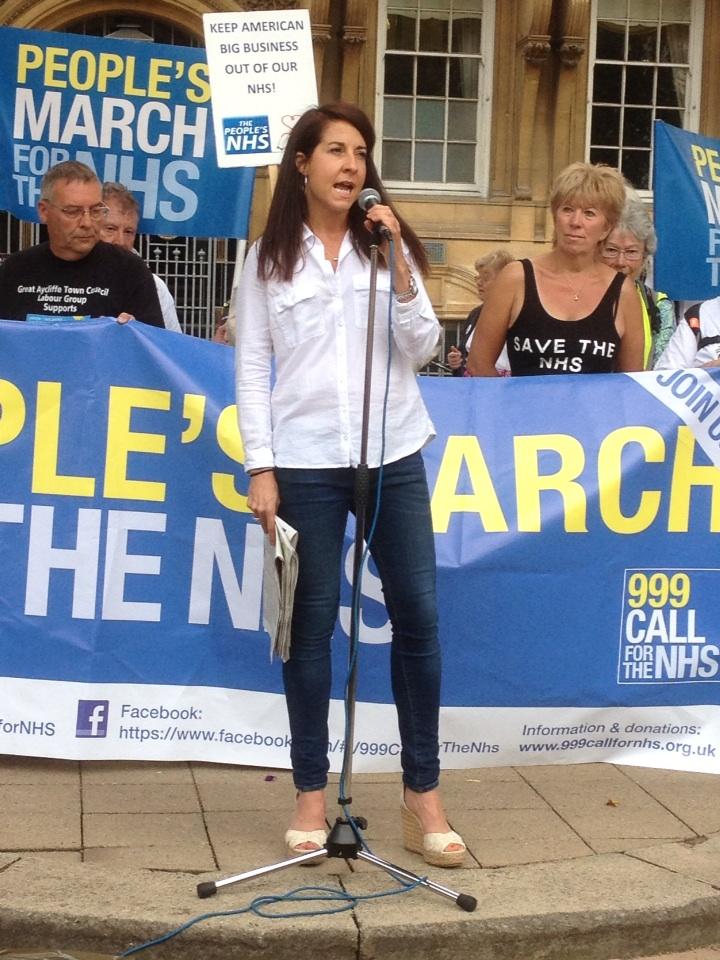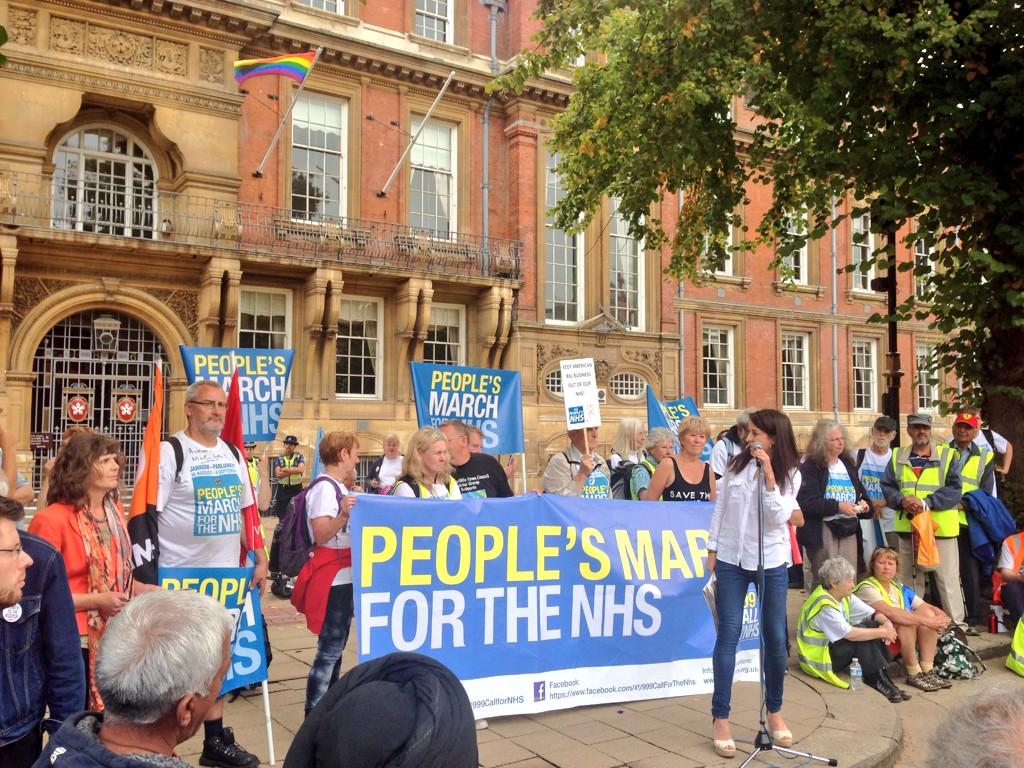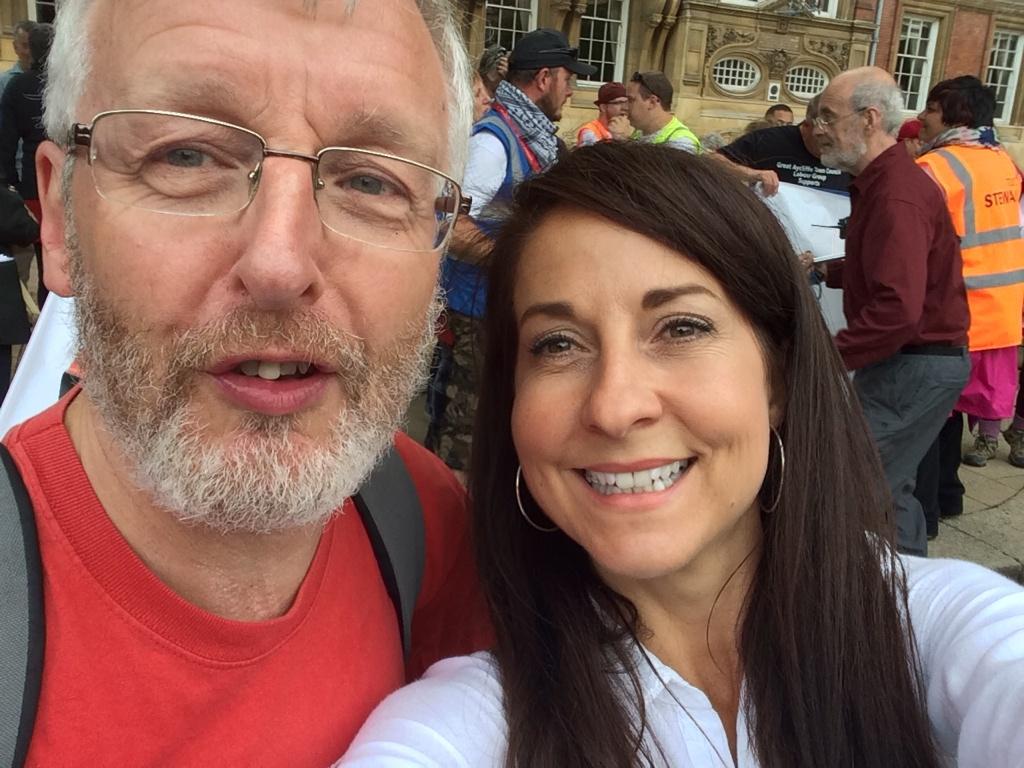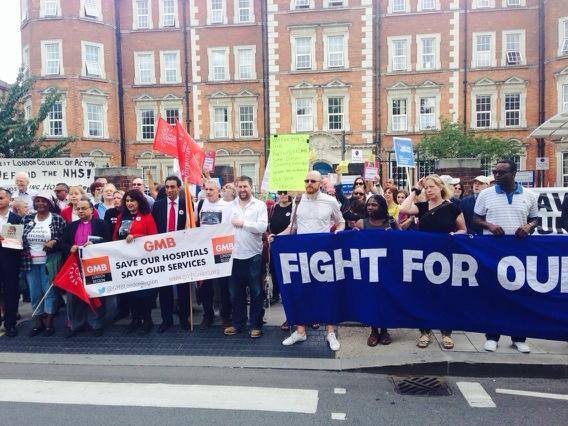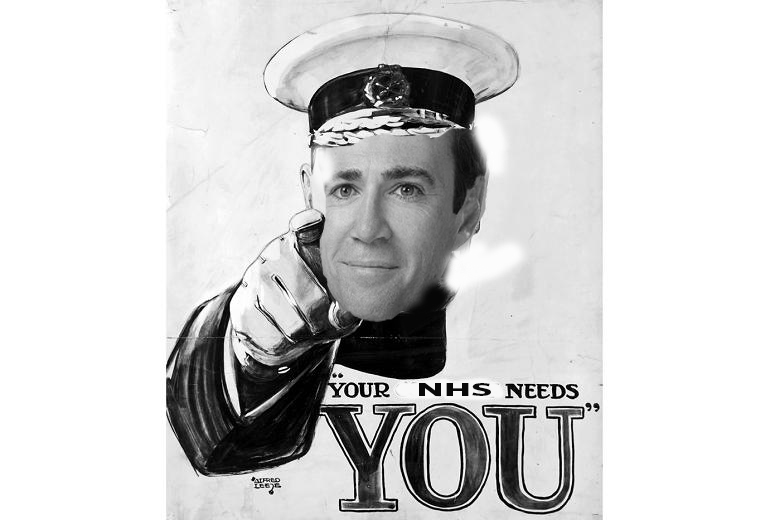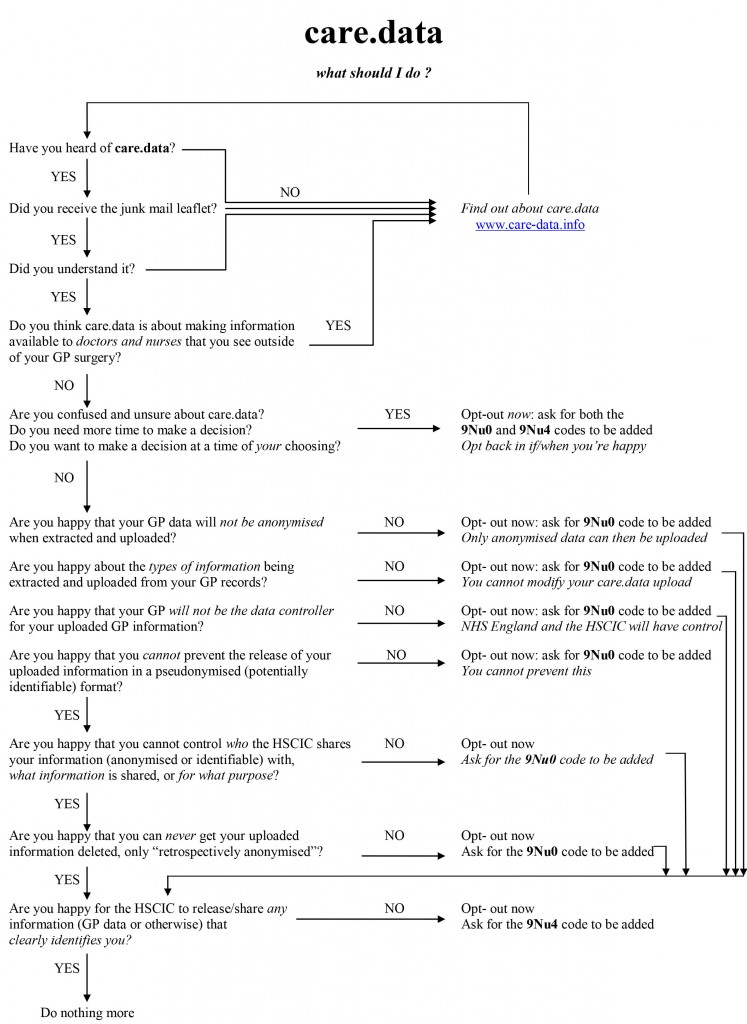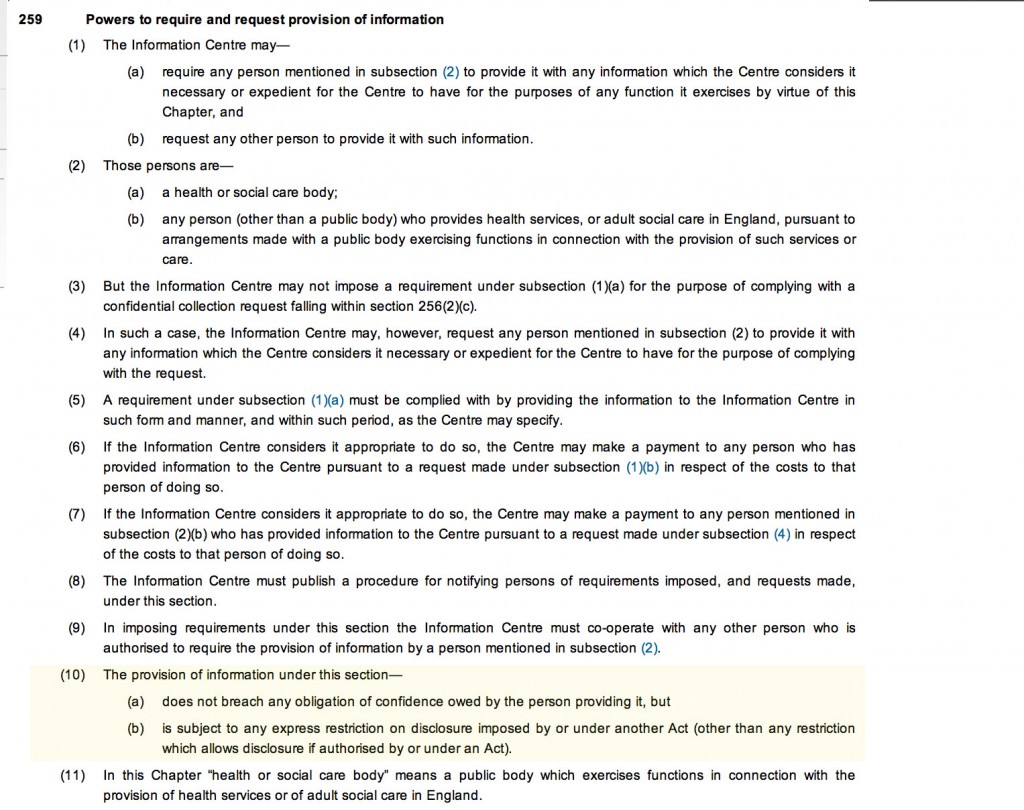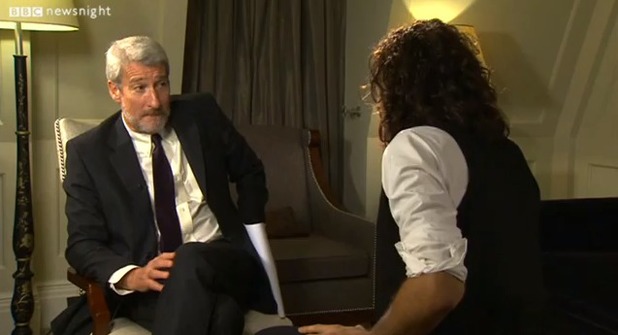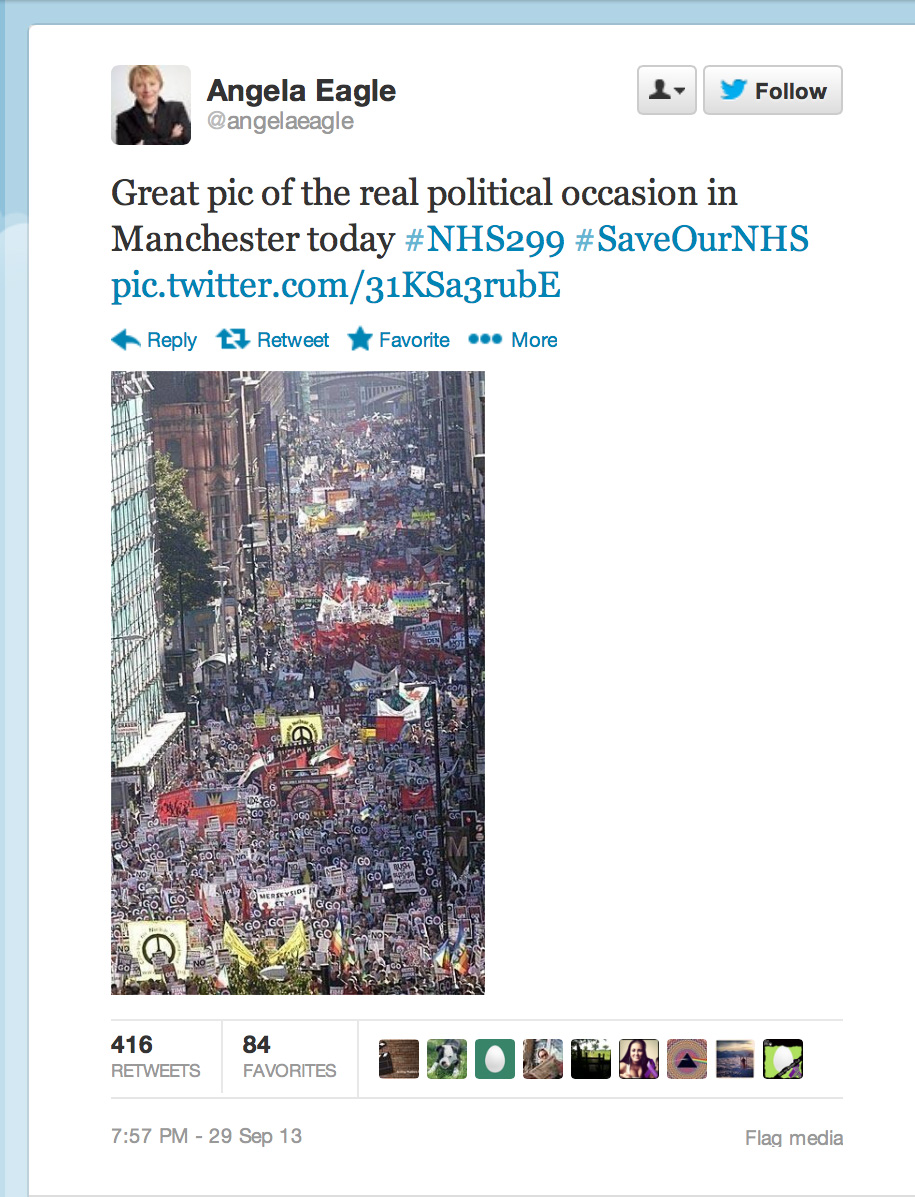Home » Campaigns
A triumph of optimism defeats cynicism as the Darlo Mums arrive in Trafalgar Square
The stench of sleaze from the backdoor lobbying culminating in the Health and Social Care Act (2012) was unable to overcome the sheer sense of euphoria and triumph of optimism defeating cynicism yesterday. Yesterday was history in the making, as all political parties were put on notice:
“Whose NHS is it? It’s our NHS”.
Whilst numerous governments have elaborated at length about the politics of ownership of public services, the message from the crowd of five thousand or so, within hearing distance of the Houses of Parliament, was loud and clear.
Many famous Labour members of parliament could be seen watching proceedings as the afternoon progressed, including Diane Abbot, Clive Efford, Jeremy Corbyn, Sadiq Khan, as pictured here.
It was a very sunny day here in Central London. There was a charged sense of energy, optimism and solidarity as about five thousand people attended a pro-NHS rally in Trafalgar Square, the culmination of a 300-mile march organised by a group of mothers from County Durham.
The group from Darlington, the Darlo Mums, are opposingthe privatisation of the NHS. It was very emotional when Rehana Azam announced the names of the Darlo Mums, “the most amazing people I’ve just spent the last three weeks with.”
The warmth of the #999CallfortheNHS campaign was evident throughout the whole afternoon. The event was immaculately organised, and was a thoroughly enjoyable event for all.
About 30 people had taken three weeks to march the full 300 miles from Jarrow in South Tyneside, organisers said.
Darlo Mums founder Joanna Adams said: “It’s been magic really. You only have to look over there [at the protesters gathered] to see people are behind the NHS and support what we’re saying. Joanna Adams described the mums as “ordinary”, but I beg to differ – they are entirely extraordinary in my opinion.
Andy Burnham MP, Shadow Secretary of State for Health, broke off all prior arrangements to attend, emphasising the indecency that would have occurred had he not come to represent the political party which had legislated for the birth of the NHS in 1945. Burnham’s speech was equally positive and optimistic about the future, speaking of the need to remedy public over privatisation, integration over fragmentation, people before profit, and collaboration over competition. Again, as is usual for Burnham who has great political gravitas, there was a sense of the current Government simply treading water in office until a person with substantial experience resumes office once again.
Burnham emphasised yet again that an incoming Labour government will repeal the Health and Social Care Act (2012) in its first Queen Speech, and said that it would then negotiate the UK out of TTIP, the transatlantic US-EU free trade treaty. Currently discussions are held in secret.
Sadiq Khan MP said the #Darlomums were the best England have had since 1966. As the MP for Tooting, Khan has been an ideal position to witness the effect the NHS changes have had on the nation’s capital.
Clive Efford MP described his Private Member’s Bill to repeal the damaging competition rules that the Tory-led Government inflicted on the NHS in its Health and Social Care Act 2012. The speech was very well received.
Even Dr Clive Peedell, Co-Chair of the NHS Action Party, called Andy Burnham’s speech “great”, having run 66 km himself to be there. It was announced that Dr Louise Irvine, an inner city GP and BMA council member, would be standing against Jeremy Hunt MP in the South West Surrey seat. Dr Peedell has of course seen at first hand the impact his specialty (oncology) has had on national politics, in the case of Aysha King.
And in the court of public opinion, according to the Daily Mirror last night, Dr Irvine was significantly more popular than Jeremy Hunt. We do know, of course, that the Daily Mirror do not comprise natural friends of Jeremy Hunt.
‘We keep on being told the NHS is unaffordable. THAT IS A LIE.”, said Rufus Hound. This lie has of course been one of the most powerful tools of the media who have called the consistent underfunding of services “unsustainable”.
Billy Bragg warned against blaming all cynicism on what one read in the media, saying that much cynicism was in people’s hearts – and this remained an obstacle for change.
Rehana Azam, as one of the marchers, NHS campaigner and leading light in GMB, and working mum, was one of the stars of yesterday’s event, explaining the necessary steps to get the NHS back on track.
Andy Slaughter, MP for Hammersmith and Fulham, recounted the demolition of his local NHS services, whilst Grahame Morris gave his account, as MP for Easington, of the fight against the Tories to protect the NHS. Andy Slaughter of course has a huge following in West London, and one of the key organisers of yesterday’s event Jos Bell was obviously pleased with the success of the event together with Andy Slaughter.
And finally, Question Musiq explained how he owes his life to the fast action of the Lewisham Hospital A&E in diagnosing his burst appendix, and performed his catchy rap song. Proceeds go to the Lewisham campaign.
A huge well done to everyone! A truly inspiring and memorable event.
Why the ‘999 March of the NHS’ is an important statement of democracy
There is no doubt that one should fight your battles to the hilt, but it is equally true that you should pick the right battles first. Two major battles to be had are whether NHS contracts should be aggressively pimped to the private sector, and whether the NHS should be up for sale to the highest international bidder. That is not to say that other battles are not important, but fighting these battles, I feel, will be able to tell us the future direction of travel of Labour. It’s well known that the political heart of Labour is possibly social democratic, but I feel that the ‘999 March for the NHS’ shows noteworthy twangs of democratic socialism, which has rather disparagingly been referred to as ‘left-wing populism’ previously elsewhere.
Getting Labour embroiled in a turf war over semantics I reckon is an infertile ground. The history of Labour and state ownership has long been a complicated one, as evidenced by previous Labour governments under Hugh Gaitskell and Tony Blair. When it was first established, the NHS was set up on the basis of social solidarity – everyone contributed to the cost of providing the NHS through taxes, and in return healthcare was provided by the state and available for those who needed it, when they needed it. This feeling of solidarity is indeed embed in the ‘999 Call for the NHS’.
The situation in 2014 is that rail fares are rising again, faster than average earnings. Whilst perhaps somewhat over egged, there is a genuine ‘cost of living crisis’ in England, with bills far outstripping real term wages. Employment for some is a very flimsy construct, being held together by a zero term contract. But it is true that, as under previous administrations, inequality is a problem in policy, and taxpayer subsidies are being diverted towards company profits and shareholders. Far from a smaller state, we have ended up with an unaccountable outsourced state. We have had the highest fares in Europe with profits extracted to pay shareholder dividends. In 2012/13 Northern Rail, Transpennine Express and Virgin alone paid almost £100m in dividends to shareholders after receiving over £1bn in public subsidy. Evidence shows that about £1bn per year is wasted due to privatisation, and if saved, this could fund an 18% cut in fares.
Why should the ‘People’s March for the NHS’ become so popular? Is it another example of “left-wing populism”? Left-wing populism is supposed to be a political ideology which combines left-wing politics and populist rhetoric and themes. Such a narrative normally consists of anti-elitist sentiments, opposition to the system and speaking for the “common people”, including themes of anti-capitalism, social justice, pacifism and anti-globalisation, whereas class society ideology or socialist theory is not as important as it is to traditional left-wing parties. The turbo-boosting of the privatisation of the NHS and the decimation of legal aid in England have therefore been good reasons for left-wing populism to gain momentum.
Robert Peston once famously asked, “Who runs Britain?” And looking at the recent elections to the House of Lords, one wonders how certain people get to such elevated heights of power. Meanwhile, Democratic socialists believe that both the economy and society should be run democratically—to meet public needs, not to make profits for a few. For a good such as water, where there is nothing to tell the difference between one brand of water and the next, it is hard to see how a privatised utility system is of benefit other than to corporate shareholders whether here or abroad. Democratic socialists do not want to create an all-powerful government bureaucracy, but likewise they do not want big corporate bureaucracies to control our society either. And some of the private providers in running public services, whether NHS, security, or probation, or otherwise, have been a disaster.
People often criticise Labour of having lost its roots. Indeed, it is hard to see how the most loyal Tony Blair critic should think of the Jarrow March as particularly Blairite? Jarrow is a small industrial town near to the southern mouth of the River Tyne, situated six miles east of the city of Newcastle. Despite the efforts of industrialist and Member of Parliament Sir John Jarvis, by September 1935, Jarrow had lost most of its heavy industry, and unemployment stood at 72.9%. The march was to find jobs to support Jarrow men and their families. It was also a bid for respect and recognition, not only for the people of Jarrow, but for others in a similar situation all over the country. The marchers had no resources other than their own determination, and some good boots supplied by the public. The irony about keeping wages stagnant in the NHS is that this is at a time when the country’s economy is supposedly improving, and when demand for the NHS is outstripping supply.
The People’s March for the NHS will arrive at its destination in London this Saturday, 6 September 2014, when campaigners will be joined by thousands of demonstrators for the final leg from Red Lion Square to Westminster. Started by a group of working mums from Darlington committed to stopping the privatisation of the NHS, the ‘999 Call for the NHS’ march left Jarrow on 16 August and has been winding down the country for the last three weeks following the route of the original Jarrow Crusade. The Chair of the London Socialist Health Association (@SocHealthLondon), Jos Bell (@jos21) has helped with some of the organisation over The final leg of the march, which will start at 2.30pm from Red Lion Square, Holborn, in London, with campaigners gathering from 1.45pm. There will be a rally in Trafalgar Square form 3.30pm with speakers including columnist and author Owen Jones. Further details can be found here.
But I feel that this march is much more than a publicity stunt or an item of ‘left populism’. It for me goes to the heart of a social democracy malaise gone wrong. It is indeed true that many northern European countries enjoy tremendous prosperity and relative economic equality as a result of policies pursued by social democratic parties. Social democratic parties supported strong labor movements that became central players in economic decision-making.
But globalisation of neoliberalism can be seen as a threat as well as an opportunity. With the globalisation of capitalism, the old social democratic model becomes ever harder to maintain. Stiff competition from low-wage labour markets in developing countries and the constant fear that industry will move to avoid taxes and strong labour regulations has diminished (but not eliminated) the ability of nations to launch necessary economic reform on their own. The idea of the NHS participating in this race to the bottom, where radiology opinions are outsourced in a disruptive manner to a foreign jurisdiction which we cannot easily regulate, strikes many people with fear.
Many have long felt that social democratic reform must now happen at the international level. Multinational corporations must be brought under democratic controls, and workers’ organising efforts must reach across borders. The European Commission is currently involved in negotiating a free trade arrangement of unprecedented scale between the US and European Union (EU). This is the Transatlantic Trade and Investment Partnership (or TTIP). The process is also undemocratic as the substance of on-going negotiations is largely kept from our MPs, MEPs, as well as the public. Once the treaty is signed by negotiators, the UK parliament, like other EU member states, will only be able to vote to accept or reject the treaty as a whole: they will not be able to amend it in any way.
Many believe that one of the biggest prizes of the agreement for transnationals will be the NHS. The Health and Social Care Act (2012) and the regulations for implementing it (Section 75) have changed the fundamental nature of the NHS. By fragmenting the NHS, opening it up to competition law and turning the NHS into a market in which private companies can compete for NHS funding for patient services, the Health and Social Care Act contains a toxic tool which can put profit before people, and lead to the piecemeal destruction of the NHS. Labour has pledged to repeal the Health and Social Care Act (2012), which of course they must do to avert the biggest sale of the century.
Put your money where your mouth is. Campaign for the NHS not incessantly whinge.
We might disagree on various things to do with the NHS, but there’s no doubting the robust commitment of ‘Keep Our NHS Public’ (@KeepNHSPublic) and the ‘National Health Action Party’ (@NHAParty) Despite their obvious clear antagonism to the Labour Party, I think the last thing they want is another Conservative government, this time propped up by UKIP. Twitter’s where it’s at, and both Dr Jacky Davis (@DrJackyDavis) and Dr Clive Peedell (@cpeedell) are extremely ‘media savvy’. Marcus Chown (@MarcusChown) is indeed known to be one of the high-impact ‘influencers’ of Twitter.
But bloody Nora. You can even order on the internet a box of 500 wristbands in a colour of your choice, with lettering in a font of your choice.
It’s tempting to buy a box of 500 with the words, “Make PFI history”, or “Make the internal market history”.
Or “Make the purchaser-provider split history”.
But you’d have to make the lettering increasingly smaller to make it all the criticisms about previous Labour health policy fit onto a small wristband.
But there is every chance that the general election will make “Make Miliband history”.
So far, there’s not even been a smidgeon of what Ed Miliband intends to do about the private finance initiative in the context of NHS infrastructure, or what he intends to do to prevent accident and emergency departments being selectively killed off during the lifetime of the next Government.
All of this is very awkward. If the bacon-butty haters are onto something, Ed Miliband (@Ed_Miliband) won’t be in the next Prime Minister after all that. And we could see the privatisation of the National Health Service receive atomic rocket boosters.
You won’t get whole person care either. The decline in social care inevitably will reach apocalyptic proportions.
And yet on the coalface we’ve got Jos Bell (@jos21), Chair of the Socialist Health Association London division, actively campaigning. Here is her excellent interview on LBC.
This was shortly followed by Andy Slaughter (@hammersmithandy), elected as the MP for Hammersmith in 2010.
With the lack of reporting on the NHS on the BBC at all-time new lows. there will inevitably be a lot of benefit in campaigning from those who are savvy with the social media. But I don’t think the battle for the soul of the NHS will be won on the pages of the Guardian newspaper, either.
If certain “campaigners” spent less time writing voluminous emails and documents which go nowhere, and learnt how to use Twitter instead, this would help the cause immensely. Éoin Clarke (@DrEoinCl) in a relatively short space of time has gained a massive following, and his observations are highly influential – much more so than the official press office of Labour, some might say.
Gabriel Scally (@GabrielScally) has been tireless in myth busting on Twitter. Kailash Chand (@KailashChandOBE) is personally a very supportive bloke, in addition to producing a prolific output of articles, in for example Pulse or GP magazine. Both are not ‘terrified of Twitter’.
And the superb Shadow Secretary of State for Health – Andy Burnham (@andyburnhammp) and the outstanding Labour Health Team (@LabourHealth) are leading by example.
The Shadow Minister for Care and Older People is Liz Kendall (@leicesterliz) and is highly influential too.
Jamie Reed (@jreedmp), Debbie Abrahams (Debbie_Abrahams), Andrew Gwynne (@gwynnemp), and Luciana Berger (@lucianaberger), are all in the front guard too.
Dr David Wrigley is an outstanding campaigner (@DavidGWrigley); and for another inside view from the profession, a great blog and twitter timeline are from Dr Jonathon Tomlinson (@mellojonny).
They all tweet even when the going gets tough.
@LabourPress is a great way to catch up with key speeches by leading members of @UKLabour nationally.
You will find few truer advocates of the #saveourNHS campaign than Grahame Morris (@grahamemorris), Chair of @LabourLeft, and MP for Easington. Grahame is always polite, fair and precise in his questioning for the House of Commons Health Select Committee. Possibly a future Chairman of this committee?
Tweeters can only ignore @Jeremy_Twunt at their peril. No cruelty in his compassion. Never knowingly behind a tree.
There’s a battle still to be won, if you’re up for it.
Campaigners – your NHS needs you!
Andy Burnham MP recently commented,
“David Cameron used to say that his priority could be summed up in three letters: NHS. Now, it seems, he prefers not to talk about it. The word in Westminster is that, on the advice of Lynton Crosby, the Prime Minister has asked his ministers for a period of pre-election silence on the NHS. So the Queen’s Speech came and went without even a mention of Mr Cameron’s erstwhile priority.”
The NHS says 299,031 patients arrived at A&E departments last week – the highest number on record.
The NHS is set to be a key battleground at the general election and Labour intends to keep it at the forefront of the public mind in the coming months. The plan is now it will use a private member’s bill to lay out how it would repeal the coalition government’s controversial Health and Social Care Act (2012), which had a number of after shocks.
The bill, proposed by Clive Efford MP, would rewrite the rules that put competitive market tendering of services as the default option until proven otherwise. It will be debated in the Commons in November and Labour candidates in marginal seats will call on Tory and Lib Dem incumbents to back the bill, while highlighting examples of how current rules waste money and fragment care.
In fact, this legislative manoeuvre is necessary whichever party comes to power on May 8th 2015. The current legislative framework makes it very difficult for services to be commissioned which promote integration, for fear of breaching competition regulation.
The Shadow health secretary claimed the vote on the bill would “without doubt be the defining moment of what remains of this parliament”.
This private member’s bill is designed, presumably, to keep the NHS on the political and news agenda. Given the blanket reluctance of the BBC to discuss this £3bn re-disorganisation, campaigners will mainly have to resort to the social media to get their message across.
The bill is also designed to drive a wedge between the Conservatives and the Liberal Democrats. At some stage before the general election on May 7th 2015, the Liberal Democrats might wish to distance themselves from the current Conservative policy. It is nonetheless noteworthy that Paul Burstow remains adamant that opposition to hospitals suddenly closing from Labour will not work in the long run.
The Liberal Democrats, to put it simply, need this ‘differentiation strategy’ to survive. Otherwise, it will be completely annihilated as a political force. The Liberal Democrats were instrumental in getting the Lansley Act onto the statute books in both the lower and upper houses. The concept of them repealing their own legislation in a coalition after 2015 is completely unacceptable for many in the Labour Party.
And there is plenty that all NHS campaigners can unite upon, whatever political creed.
First and foremost, it would be motherhood and apple pie for the duty of the Secretary of State for Health for the National Health Service to be restored.
Secondly, it is likely that Labour will wish to see the increase in the ‘private patient income cap’ abolished. I have written about it in great detail here.
The current situation regarding the “private patient income cap” (more correctly an “income cap for non-NHS work“) in the Health and Social Care Act, through s. 164(1)(2A), is described as follows:
An NHS foundation trust does not fulfil its principal purpose unless, in each financial year, its total income from the provision of goods and services for the purposes of the health service in England is greater than its total income from the provision of goods and services for any other purposes.
In an interesting development reported this morning, hospitals are to be banned from charging patients up to £72 a day to park their cars under plans being drawn up by ministers. It is reported that some hospitals charge up to £4 an hour – and in some areas £72 per day – for parking spaces, with costs running to hundreds of pounds for those who make repeated visits for treatment.
It is also claimed that the worse-affected include cancer patients who cannot take public transport because they have reduced levels of immunity, and the parents of premature babies, whose children are often kept in hospital for several weeks.
The abolition of this lifting of the income cap for non-NHS work would go far wider than the Coalition’s targeted strike on car park charges.
A grave concern has been that competition rules ‘hold back quality‘. I first wrote about this at the beginning of January 2013 on this blog. The provision (“section 75″) puts rocket boosters into aggressive pimping of NHS services in the private sector, and the rest as they say was history.
In October 2013, it was reported that two NHS hospital trusts in Dorset would not merge on the basis of clinical need, according to the Competition Commission, an economic regulator overseeing the implementation of competition law applying to this country.
Whilst Jeremy Hunt never mentions the Lansley Act, there’s no doubt that Labour will wish to repeal it in the first Queen’s Speech of a Labour government. It appears to have appeared to have come from nowhere, though a very good description of how it came about comes from Matthew d’Ancona’s outstanding “In it together” and Nick Timmins’ outstanding “Never again”.
It’s undoubtedly a turgid piece of law, which reads like a patchwork quilt of commercial and corporate law relating to competition, regulation and insolvency. There’s only clause on patient safety, and that enables the abolition of the National Patient Safety Agency. In fact, the Draft Bill on regulation of clinical professionals, proposed by the English Law Commission, thought to be a landmark piece of legislation to promote patient safety, has been bounced into the lifetime of the next parliament.
Despite its length, the Lansley Act has three clear aims: firstly, to outsource NHS services into the private sector as easily as possibly, to bolster the functions of an economic regulator (“Monitor”), and to accelerate the managed decline of NHS units which run into financial trouble. It is indeed a result of a need to ‘liberalise the NHS market’, but as Iceland found out in their large experiment of deregulating the banks, the Lansley Act experiment may be just about to go horribly wrong. NHS campaigners, if they unite, can help to seal its fate.
NHS campaigners have never been so important as now, but the best is yet to come
It had been possible once upon a time to discredit NHS campaigners as merely NIMBY activists who couldn’t see the big picture of running the NHS. And yet they have been more than an eyesore to this current Government, which, like previous governments, has tried to promote ‘patient choice and control’. The philosophy of ‘think global, act local’ has clearly run into problems as local activists continue to argue correctly that the big picture has been uncompelling. They cite a lack of resolution in the costly PFI programme which has acted as a malign influence on the NHS since the late 1980s. It’s also impossible to ignore patient campaigners who complain about unsafe hospitals. So, whatever gloss political parties themselves want to put on the importance of the NHS, the reality is that many people in the general public have a very clear idea what has been going on. Whichever political party can capture the public mood will win the trust of many voters.
In as much as problems in the NHS have been rarely discussed by mainstream media who are either ignorant or wilfully neglectful, it is not easy to ringfence complaints from the last few years, since May 2010, as “one offs”. They represent, rather, fundamental faultlines in English policy. Whichever political party can do the least worst job of managing them will make a killing, but it’s clear now many voters are clearly sick of the endless crap. They should like to see a properly funded NHS from general taxation, and are particularly sensitive to any initiatives which sound nice but can lead to commissioning decisions cutting services in reality, such as ‘Big Society’ or ‘dementia friendly communities’.
Only last week, it was announced that controversial moves to offer the running of George Eliot NHS hospital in Nuneaton to private companies have been abandoned, as described here in this excellent article by Caroline Molloy. The barrage of foul-smelling media stories and focus on the hospital standardised mortality index have left many Trusts unable to come to the surface for air. But some Trusts clearly asphyxiated by the toxic attitude of some in the media have come out fighting to their credit. For example, the volte face in Nuneaton has been put down to an improved performance, with A&E and mortality figures now in line with the average or better. The George Eliot was to have been only the second hospital in the country to face a private franchise takeover. The final three bidders in the running were private companies Circle UK (the hedge fund backed ‘social enterprise’ ), fellow Tory donor-owned Care UK, and South Warwickshire Foundation Trust as the last NHS bidder standing. A second NHS Trust, Coventry, was controversially excluded from bidding last month due to the size of its PFI debts.
Proponents of patient safety nonetheless say there is unfinished business, with a need for a much safer culture for whistleblowers and a statutory ‘duty of candour’. And advocates of the HSMR will wish to point out that these metrics have identified problems which would otherwise have been hidden. But it would be impossible to deny the attractiveness of safe healthcare organisations. Whatever one’s ideological position on the rôle of the State, safety is an unifying issue for voters. The concern for critics of privatisation, the number of which are huge (not just from the NHS but from failures in other sectors such as energy), is that who runs entities in the NHS has a direct bearing on patient safety, because of lack of transparency through, for example, freedom of information legislation.
Ultimately, members of the public vitriolic about NHS policy might have three good routes in which to manage their anger. Firstly, they can vote out parties which they feel do not prioritise their needs. This could be good legitimate avenues for prominent NHS campaigners, such as Andy Burnham, Clive Peedell, Rufus Hound or Dr Louise Irvine. Labour, if it gets its response right, can capitalise on the way the NHS has been politically managed by Andrew Lansley and Jeremy Hunt too. The popularity of Andy Burnham continues to raise eyebrows, not least his own. The Health and Social Care Act (2012) can be repealed, and we can all start again, but the concern must be the further de-re-organisation doesn’t cause further mayhem.
Secondly, they can, if resources allow, members of the public can take the Government to court. Whilst this might seem a bit of a ‘nuclear option’, it’s an approach which has been highly successful. During the summer of 2013, a High Court judge ruled Mr Hunt acted outside his powers when he decided the emergency and maternity units should be cut back. The government turned to the Court of Appeal on Monday in an attempt to get the decision overruled, as Mr Jeremy Hunt had previously claimed the move would improve patient care. He lost, and the rest is history. The current government did manage to legislate on the deeply unpopular clause 119.
The current Government seems totally oblivious to the concerns of the general public, to maintain their cosy relationships with the corporate community. Parliament was assured that clinicians would be under no legal obligation to create new markets. However, the section 75 regulations accompanying the Health and Social Care Act (2012) promoted and permitted transfer of resources from the NHS to the private sector, and extended competition into every quarter of the NHS regardless of patients’ interests. The new reforms of which these regulations are a key part remove the legal framework for a universal, publically provided, publically managed, publically planned, democratically accountable health service. The Department of Health itself allowed insufficient time to set this system up properly and enable thorough scrutiny. The upshot has been to drive the NHS towards open market competition with inevitable fragmentation of services and an ever increasing role for private companies in the business of the NHS. I spoke to a train guard at King’s Cross, wearing a Virgin Trains jacket, expecting him to be very pro-privatisation, but he said that privatisation of the railways in parts of the UK had been a total disaster.
Thirdly, you can write an article in a GP magazine or make a film. Peter Bach made a very successful film, “Sell off: the abolition of your NHS” which is going through a final edit. Both Dr Jacky Davis and Dr Louise Irvine speak brilliantly in the film on the issues of the ‘democratic deficit’. Given that the mainstream media have continued to ignore the changes in the NHS traditionally, their opinions are clearly a polite (not desperate) plea for members of the general public to become informed and involved. My personal hunch is that people are more informed than they might first appear, and these European Elections and the General Election will not come soon enough.
Carville’s famous phrase started, “It’s the economy stupid”, but many people in fact forget the finish. That is, “But don’t forget about healthcare”. The response of the public may be to make a fast emotion-based decision rather than a slow cognitive-based decision, in the fashion of Daniel Kahneman’s “Thinking fast and slow”, but that’s why mainstream politics are in fact quite frightened of Nigel Farage. Farage taps into an emotional sentiment which overlaps with nostalgia, and for the man down the pub the NHS is a burning issue too. Politicians would therefore ignore NHS activists at their peril.
Dr Neil Bhatia’s #CareData flow chart
This is Dr Neil Bhatia on Twitter here, @docneilb.
Feel free to contact him over opting out from #CareData.
Here Phil Booth (@MedConfidential) campaigner battling against erosion of valid consent, so essential plank for the medical profession, and Tim Kelsey (@TKelsey1), a guru in big data for the NHS, battle it out.
Flow chart
Will the war over NHS privatisation be won on the social media or on Question Time?
In his lecture for the LSE recently called “These European Elections Matter”, Nigel Farage explained how the 1999 European Elections had been a ‘gamechanger’. This election had apparently returned three MEPs, and Farage explained that this result had only been achieved through the method of proportional representation. Farage concluded that, despite no MPs, this had meant UKIP was suddenly being involved in contemporary political debates on the BBC such as “Question Time” or “Any Questions”.
The situation how the UK entered Europe is almost a counterpoint to the situation why people want the NHS to leave behind market dynamics. The United Kingdom referendum of 1975 was a post-legislative referendum held on 5 June 1975 in the United Kingdom to gauge support for the country’s continued membership of the European Economic Community (EEC), often known as the Common Market at the time, which it had entered in 1973 under the Conservative government of Edward Heath. Labour’s manifesto for the October 1974 general election promised that the people would decide “through the ballot box” whether to remain in the EEC. The electorate expressed significant support for EEC membership, with 67% in favour on a 65% turnout. This was the first referendum that was held throughout the entire United Kingdom.
There has never been as such a referendum on whether the market should be forced to leave the NHS, but many feel that this is an equally totemic issue. It’s quite possible that the 2015 general election on May 7th, will have a low turnout generally if all the main political parties fail to capture the imagination of the general public. Using a market entry analogy, the question is how UKIP and NHAP enter the market of politics. It’s possible that UKIP could manage to come top in the European elections, though this is yet to be seen. UKIP are not opposed to UK in some sort of market with Europe, whilst wishing to not be embroiled in ‘spending £7 million a day for something undemocratic and unaccountable from Brussels’. Likewise, NHAP (National Health Action Party) is also concerned about the lack of democracy and accountability which appears to have become a pervasive theme in English NHS policy, and wish the NHS not to be fettered by the markets (for example European competition law). UKIP appear virtually weekly on Question Time, so the question is in part how can health issues compete for air time? Labour could even benefit from their greater presence in explaining their health policy, which is supposedly to escape the free market and TTIP. And NHAP could hold Labour to account on this issue, and other significant issues such as NHS reconfigurations and PFI. Conversely, UKIP is all for free trade.
Dr Lucy Reynolds soldiers on. As an academic in the highly prestigious London School of Hygiene and Tropical Medicine, Reynolds has developed an understanding of health policy which is unrivalled by many. Lucy has been quite successful in getting her well informed views across in the social media.
Dr Lucy Reynolds doesn’t have the luxury of Question Time.
Nigel Farage’s main complaint about Question Time is one of hostility to his party’s stance:
“I am one of the few people who can’t really complain about the editorial policy of Question Time having been on it 26 times since I was first elected in 1999. In terms of the coverage it gives Ukip I have found it fair and in the past few years the programme has even started accepting Ukip panellists other than me! But there have been a couple of programmes in which my colleagues and I have faced a hostile audience which in no way represents how Ukip is normally received or which are representative of the opinion polls. I am not pointing the finger of blame at the QT team but the question I want to ask is whether the Question Time audiences being exploited by the hard left?”
Even when Question Time was recently hosted at Lewisham, the number of questions on the NHS was kept to a bare minimum. This has been a general trend with this flagship TV programme, although the producers consistently cite that they can only air debates on questions proposed by audience members. However, occasionally dissent does ‘break though’ unpredictably. There have been over 86,000 ‘hits’ for a lady in the audience in Lewisham QT here
If it feels as if Nigel Farage is rarely off Question Time, that’s because he isn’t. Farage appeared more times on the programme than any other politician in the last four years. Top performers on #BBCQT include Nigel Farage, Vince Cable, Ken Clarke, Caroline Flint, Peter Hain, Caroline Lucas, Theresa May, and Shirley Williams. The arguments for Farage appealing to producers are that he is charismatic, inspires debate and helps them to fufil their requirement to give representation to smaller parties. But surely the same can be said for some experts in health policy?
Dr Louise Irvine (@drmarielouise), a GP in New Cross, south east London, and chair of the ‘Save Lewisham A&E’ campaign, has recently announced she will be standing for the National Health Action Party in the European Parliament elections on the 22 May 2014. Dr Irvine has said the NHS was under threat from an impending EU-US trade deal and the Government’s policies of ‘top down reorganisation, cuts and privatisation’.
She said: ‘I want to use this election to raise awareness of the imminent danger posed to the NHS by the EU/US trade agreement which will allow American companies to carve up the NHS and make the privatisation process irreversible.
‘I also want to alert the public to the gravity of the threat to the NHS from this Government with its programme of cuts, hospital closures and privatisation and to send a powerful message to politicians in Westminster and Brussels that people will not stand by and let their NHS be destroyed.
‘If elected, I will strive to ensure that EU regulations don’t adversely affect the NHS and are always in the best interests of the health of British people. The health of the nation spans all areas of policy from the environment to the economy.’
Dr Irvine is not only the “new kid on the block”. Rufus Hound is planning to run for the European Parliament to campaign against the privatisation of the NHS, saying he wants to preserve “one of the single greatest achievements of any civilisation”. In an impassioned blog post, he accused the Conservatives of wanting to sell off the health service to party donors – claiming that the Health Secretary, Jeremy Hunt, was “killing the NHS so that his owners can bleed you dry”.
The NHA was set up by Dr Richard Taylor, a former independent MP, to campaign against the Government’s Health and Social Care Act, introduced under the previous health secretary, Andrew Lansley. The party plans to field 50 candidates in the 2015 general election. Dr Clive Peedell (@cpeedell) has also been talking to the social media to get the NHAP’s message across’ he is one of the co-leaders.
The Max Keiser/Clive Peedell interview is here.
To give them credit, Dr Marie Louise Irvine and Rufus Hound offer us a chance to discuss the NHS, in the same way Nigel Farage and, say, Patrick O’Flynn (@oflynnexpress) offer us a chance to discuss our membership of Europe. The criticism is that they represent single issues and do not have a coherent corpus of policies across the full range of policy areas, and indeed have no realistic chance of forming a government. But paradoxically they both do offer a chance for domestic policy to operate in such a way Portcullis House doesn’t become another neoliberal outpost of the Federal United States of Europe. In the NHS’ case, socialism might only survive if it is not engulfed with yet more Atlantic Bridge-type stuff next parliament. But UKIP would not probably stop that. Who knows if Labour would be able to either in reality.
Sledgehammers and nuts: opt-outs and data sharing concerns for the NHS?
You couldn’t make it up.
“a substantial number of GPs are so uneasy about NHS England’s plans to share patient data that they intend to opt their own records out of the care.data scheme.”
“The survey of nearly 400 GP respondents conducted this week found the profession split over whether to support the care.data scheme, with 41% saying they intend to opt-out, 43% saying they would not opt-out and 16% undecided.”
Simon Enright, Director of Communications for NHS England, tweeted to indicate methodological issues with concluding too much from this ‘snapshot survey':
@legalaware disappointing that Pulse did self-selecting sample with potential question bias in survey.
— simonenright (@simonenright) January 26, 2014
And of course Simon Enright is right. But one has to wonder how much GPs themselves have been informed about the debate about data sharing concerns. GPs are trained to explore, and in fact examined on exploring, the ‘beliefs, concerns and expectations’ of their patients; so it would be unbelievable to assume that no one had had this particular conversation with a patient.
GPs tend to be a very knowledgeable and versatile group of medical professionals, and indeed many have an active interest in public health.
But here there’s been another problem at play? All of the patients who I know, because of the known issues in waiting for an appointment to see their GP for ‘routine matters’, have decided to opt-out by simply dropping in to sign a form with the receptionist. But that sample could even be more unreliable than the Pulse survey.
For all of the huge budget that’s set aside for NHS England’s interminable activities on patient engagement in the social media and beyond, you’d have thought a spend on explaining data sharing would’ve been money well spent?
Views on an individual’s right to ‘opt out’, described in a previous blogpost of mine, vary.
There are many good arguments for proposing the sharing of care data, but the lack of willingness of industry, primary care or public health to discuss openly how data sharing might be necessary and proportionate, under the legal doctrine of proportionality, is utterly bewildering.
What has resulted is an almighty mess.
In as much as there is a ‘root cause’ of this problem, an unwillingness to make the arguments for data sharing with the general public is a good candidate.
Julie Hotchkiss, a public health physician, has for example written to Tim Kelsey about the matter today.
Dear Mr Kelsey
re:Care.data
I think there is so much to be gained by collation of personal health data – for epidemiological observation (prevalence, time trends, variation), allowing data-linkage enjoyed by other countries such as Sweden, to aid commissioning of health services as well as, of course, for direct patient care. For all these reasons I support in principle the care.data initiative. However I have grave concerns about how the data might be used. I am aware that many, many people share these concerns, and many of these have been expressed in the press in recent weeks. Many of my colleagues (long term NHS employees) are saying they will opt out. There are a number of senior voices in the Public Health world who are urging people to opt out.
NHS England is in a unique place to be able to address these concerns – but in many ways the horse has bolted, and I fear we may never get it back in the stable. PLEASE now put your energies and resources into a full and frank consultation, including IT experts, medical colleges, academia and for goodness sake – the general public! The fact that no such awareness raising and consultation has taken place makes people suspicious. They already don’t blindly trust the NHS / government anymore. So if you want to get health professionals and academics behind you in order to have a greater number of voices advocating for care.data please address the following concerns – in a published document- as soon as possible.
- definitive ownership of the data
- responsibility for data quality
- assurance (ideally in legislation) that ownership or data management will remain with a governmental agency and not be out-sourced
- will the HSC IC own the data, and allow access through a form of brokerage (allowing specific views/queries) or access to the full data set)?
- detailed Information Governance arrangements, e.g. requirements for Section 251 approval?
- what Research Governance / Ethical approval arrangements are being put in place?
- what will organisations have to pay,? and if so is this a handling fee or will they get ownership of the data?
- criteria for granting access to data and legally binding restrictions on usage of the data
- exactly to what extent will records be identifiable (for instance the long-established practice at ONS of suppressing cells with fewer than 5 individuals from disclosure)
Although I expect a response, more than this I expect published documents to detail all these issues. I’m sure there are many other details specialists in health research, Information Governance, medico-legal matters and civil libertarians would require in order to be assured that this was something in which they could participate.
Kind regards
Julie Hotchkiss, Fellow of the Faculty of Public Health
Another question for Tim Kelsey may be, potentially, whether the data from care.data will be processed according to the National Statistics Code of Practice.
It is somewhat unclear why the public health community have not had themselves a discussion with the general public, despite some advocates of this community now complaining very loudly about the presentation of ideas leading to the ‘opt out campaign’.
But they will need to confront the stench of public mistrust aimed at various politicians. Examples of events leading to this profound distrust include the NSA/Snowden affair, and relevations at GCHQ.
The corporate capture in some areas of public health is not a topic which public health physicians have wished to talk about. However, these authors somehow managed to sneak an excellent discussion of the phenomenon here in the British Medical Journal.
There have been calls for much tighter regulation of “data brokers”, as corporates wish to rent-seek this plethora of data. What always appeared to have been lacking was an “intelligent debate” with the general public about data sharing. Nonetheless, the social media, for example “Open democracy: our NHS” websites, have for a very long time been publishing relevant articles on this subject.
There was also the small issue of how the £3bn implementation of the Health and Social Care Act (2012) came into being, which led to a turbo-boost of the outsourcing and privatisation of the NHS. Members of the academic public health community were slow on the uptake there too – some would say “completely asleep on the job”, perhaps not as far as their own research interests are concerned, but on the specific issue of potential violation of valid consent for individuals.
And guess what the Health and Social Care Act (2012) also contains a legal ‘booby trap’, which many did not see fit merited discussion with the general public.
Section 251 of the NHS Act 2006 (originally enacted under Section 60 of the Health and Social Care Act 2001), allows the common law duty of confidentiality to be set aside in specific circumstances where anonymised information is not sufficient and where patient consent is not practicable. For example a research study may require access to patient identifiable data to allow linkages between different datasets where the cohort is too large for consent.
This would require time limited access to identifiable information where gaining consent from a large retrospective cohort would not be feasible and would require more identifiable data than would be necessary for linkage purposes. However, section 10 of the Data Protection Act (1988) currently allows a right for an individual to prevent damage or distress by data processing.
This is indeed conveniently “triggered” by section 259(10) of the Health and Social Care Act (2010), i.e. “[the provision] is subject to any express restriction on disclosure imposed by or under another Act (other than any restriction which allows disclosure if authorised by or under an Act”:
The trust is further eroded through the loss of data from government agencies, coherently tabulated on this Wikipedia page.
Proponents of democratic socialism have long argued that citizens often are not able to buy influence through competing with large corporates, but can legitimately exert influence through the ballot box.
There is also no doubt that people are talking at cross-purposes. There is a bona fide case for disease registries and surveillance, for example. However, the problems of an individual’s data being shared with lack of informed valid consent in the name of population presumed consent do need to be addressed ethically at least.
Public health physicians who would like to see the law applied to promote public health and research overall cannot condone profiteering from personal data abuses. Tim Kelsey has always been adamant that the English law is strong enough to cope with such threats. The scenario has mooted before of private insurance companies being able to abort insurance contracts (rescission) from data disclosed to them, on the grounds of misrepresentation or non-disclosure, but the position of the NHS England has always been to present such scenarios as far-fetched.
However, the issues appear to have been intelligently debated at European level. The draft “EU General Data Protection Regulation on the protection of individuals with regard to the processing of personal data and on the free movement of such data” (the EU Regulation), was published in 25 January 2012, and has been debated in the European Parliament for most of the time since then.
Under “Albrecht’s proposals“, health data should generally only be able to be processed for the purposes of historical, statistical or scientific research where individuals have consented to such processing. It would be legitimate for processing in the context of research to take place without consent only where: (a) the research would serve an “exceptionally high public interest”; (b) the research involves anonymous data from which individuals could not be re-identified; and (c) the regulators have given their prior approval. Consent, however, is to follow the stricter interpretation, requiring explicit, freely given, specific and informed consent obtained through a statement or “clear affirmative action”. There is, however, legitimate concerns that these proposals might damage the interests of both corporate and public health communities.
It looks very much like chaos has set in since 2010 in running the NHS. Any party can do better than this.
This is of course an almighty mess, and it is hard to know how the whole thing could have been approached better. A plethora of issues have converged seemingly at once, and there is a possibility a ‘big opt out’ would still deliver a result without the matters having been properly discussed. If you think this is bad, consider what would happen in a national discussion of the terms of our membership of the European Union?
by @legalaware
We didn’t vote for the Health and Social Care Act, so why should we believe Russell Brand?
Take two people called Russell and Jeremy in a hôtel room in London, and ask one of them to put the world to rights.
Fringe meetings for Labour Party conferences for as long as I can remember have run panel discussions about how we can engage more people in the political process. For virtually of these fringe meetings which I have attended, almost invariably is the fact that political parties introduce policies for which people didn’t vote almost every parliament.
These issues remain dormant on the mainstream media for months on end, and yet continue to enrage people in the social media. Many issues under the umbrella of social justice continue to cause anger and resentment: these include the closure of English law centres, or the NHS reforms. The media continues to be skewed against such issues. For example, the flagship programme on BBC1 every Thursday, “Question Time”, regularly features a candidate from UKIP, a party which as yet has failed to elect a single MP. They have never featured a candidate from the National Health Action Party, and yet the running of the NHS continues to be a totemic issue.
Blaming the media would be like a bad tap-dancer wishing to blame the floor. And yet protest votes are not easily dismissed. Recently, in France, the right-wing National Front has taken the lead in an opinion poll before elections for the European Parliament, in a development that has truly shocked the French political establishment. The survey, which gave Marine Le Pen’s party 24 per cent of the vote, marked the first time that the party founded in 1972 by her father has led before a national election. The centre-right Union for a Popular Movement, which led in the previous equivalent poll, stood at 22 per cent and the Socialists at 19 per cent.
Part of David Cameron’s problem is that the initial friendship towards his Conservative Party was lukewarm to begin with. The intervening years (2010-2013) have seen a Party which just appears ‘out of touch’, which makes Sir Alec Douglas-Home look trendier than a hip-hop artist. But likewise, Russell Brand is not a ubiquitously popular man himself. Whilst some people feel he stands up for their views, irrespective of his reported wealth, others find him narcissistic and nauseating.
Russell Brand is however successful at being famous, and this is a peculiar British trait. He often begins his set by talking about his love for fame: ‘My personality doesn’t work without fame. Without fame, this haircut is just mental illness.’ He has found his way of getting his name in the news, and in the tabloids. His comedy is not even that popular, but at least he has the ear of the British media. The National Health Action Party would have loved ten minutes with Jeremy Paxman, although it’s quite unlikely a ten-minute video with Clive Peedell would become an instantaneous viral hit.
Meanwhile, in a parallel universe, the UK Labour Party almost seems to have re-discovered its mojo. The triangulation of the past appealed to those in Labour who felt they could win simply by appealing to floating Tory voters. But it is a strategy that ran out of steam in 2010, leaving abandoned Blairite commentators to become embittered and self-consumed in a passion of self-destruction, while spitting bullets at Ed Miliband. Labour’s traditional supporters did not come out and vote, while floating voters saw through the cynical vote-grabbing exercises. Labour did not appear particularly ‘socialist’ any more.
Russell Brand didn’t mention the deficit once. Russell Brand did not have to appeal to his fans to say that there will be no return to the days of lavish spending. He did not have to say that he had learnt lessons from the past.
And yet deep-down voters do have excuses, if not reasons, not to vote Labour. There are some people who believe that Ed Miliband will need to identify Labour’s mistakes – the blind eye to a City running wild; an over-reliance on both high finance and a house-price bubble; or being ‘weak on welfare’.
And yet we are in a society which is absurdly superficial. Should Russell Brand have to bite the bullet for riding the crest of this banality? This strange Universe is not just occupied by reality TB stars. Many famous people are famous for being famous. Nicole Kidman is famous for being famous. Arguably, Nicole Kidman famous for divorcing Tom Cruise. At the same time when Russell Brand was selling what he sells best, that is Russell Brand, Cher was on BBC1 on ‘The Graham Norton Show’. And nobody sane can claim that Cher is the world’s best singer.
This does not necessarily mean that Labour should ignore the polls, although Labour will invariably say it ignores the polls when they are bad. From level-pegging to an 11-point lead in 10 days, Labour has plainly had a good conference, in terms of public opinion polling. After a difficult summer, YouGov’s poll put Labour at its highest level, 42%, since June. 30% now said Ed Miliband is doing well as party leader – his best rating since May. When people were asked who would make the best prime minister, Miliband (25%) was now within three points of David Cameron (28%). That was the narrowest gap since Miliband became party leader three years ago.
Ed Miliband is the one who keeps on saying that he wants ‘to tell you a story’. After the recent coverage of Ralph Miliband, paradoxically people appear to have warmed to the narrator as much as the story. In Russell Brand’s case, there is a curious mixture of some people liking the narrator as well as the story.
And yet for all of Russell Brand’s themes, such as global warming, inequality, or dominance of corporatism, for Brand it is simply entertainment. For many viewers, it is simply entertainment. Life is far from entertaining from some who have deeply suffering in this Government. Social injustices, such as in the personal independence payment or Bedroom Tax, have literally taken their casualties, and the myth of ‘the record number in employment’ has been blown out-of-the-water.
Russell Brand can be thanked for his form of escapism. But at the end of the day it is superficial crap, and not the solution to more than thirty years of failed triangulation in UK politics. We didn’t vote for the Health and Social Care Act, so why should we believe Russell Brand?
Labour’s Twitter messaging of #NHS299
One of the basic lessons of Twitter is to make your tweet ideally ‘visually eye catching’. Hence, a stunning photo might help.
It’s often said that you must make sure that ‘your content is not caught in a timewarp‘. By this, marketing professionals provide that your promotion must relate to the current configuration of a product, not, for example, a prototype.
Two Labour MPs literally decided to tweet about the #NHS299 protest outside #cpc13 by showing the same image of the ‘Stop the War’ protest against a Labour government from a few years ago.
According to Heather Stanley (@hstanley_), the source of the actual photo is in fact the ‘Socialist Worker’ from Sat 30 Sep 2006 with the caption,
Picture of 50,000 marching through Manchester on Time to Go demo
Through chance or design, 50,000 was also thought to be the number marching today.
